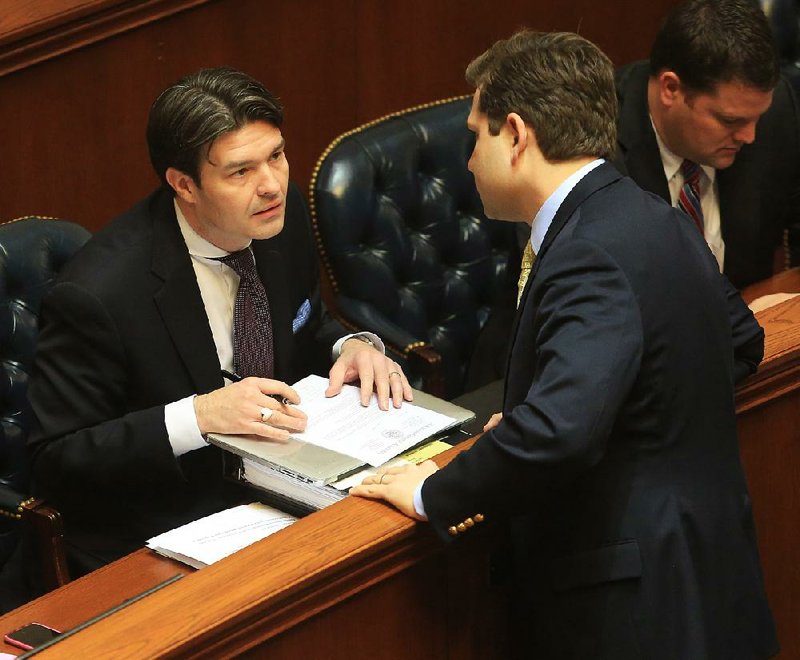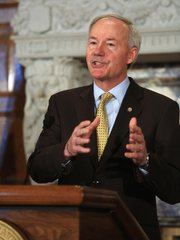State Sen. David Sanders said he threw "a little bit of a curveball" at a state board this month, urging it to delay a step in the creation of an Arkansas-based health insurance exchange.
At Sanders' request, the Arkansas Health Insurance Marketplace board has postponed its plan to solicit companies about the cost of providing the technology for a state-run health insurance exchange for individual consumers, the board's director said Tuesday.
The legislator's request comes after Gov. Asa Hutchinson last month questioned the need for a state-run exchange.
Sanders, R-Little Rock, said at a legislative oversight committee meeting Tuesday that he wants the marketplace board to wait for the results of consultants' studies before proceeding with the insurance exchange.
He acknowledged that the delay could affect the board's timeline for establishing the exchange.
The board plans to open enrollment in the fall of 2016, a target that likely would require a contract to be awarded by the end of this year, board Chairman Sherrill Wise said last month.
But Sanders told the Arkansas Health Insurance Marketplace Legislative Oversight Committee on Tuesday that he wants policymakers to have more information before the marketplace board proceeds.
"I think caution at this point is probably the best policy," he said.
Separate consultants are studying possible replacements for Arkansas' private option Medicaid expansion and the Medicaid program's problem-plagued computerized enrollment system. Their reports are expected next month.
The marketplace board selected a name and a logo for the consumer insurance exchange in July and decided last month to focus on four companies with experience establishing other states' exchanges as candidates for a contract to provide Arkansas with similar technology.
Creation of an insurance exchange for small-business employees is underway, with enrollment expected to start Nov. 1. Technology for that exchange is being installed under a $7.2 million contract with Reston, Va.-based hCentive.
The board's plans call for opening the exchange for individual consumers for enrollment on Oct. 1, 2016, for coverage that would begin in 2017.
Created by the Legislature in 2013, the board was awarded a $99.9 million federal grant late last year to create state-based health insurance exchanges that would replace the exchanges set up for the state by the federal government.
Marketplace spokesman Heather Haywood said Tuesday that she didn't know whether the federal Centers for Medicare and Medicaid Services would allow the board to delay establishment of the exchange and still use the grant money.
"That would be a request we would need to make," she said.
Under the 2010 Patient Protection and Affordable Care Act, health insurance exchanges allow consumers to shop for coverage and apply for subsidies to help pay for it.
Sixteen states and the District of Columbia established their own exchanges for individual consumers. Arkansas and 33 other states use federally operated exchanges.
Those who favor creating Arkansas-based exchanges say they could be tailored to suit the state's needs. That includes potentially providing an enrollment portal for a program that replaces the private option Medicaid program after the federal waiver authorizing it expires at the end of 2016.
The private option uses Medicaid funds to buy insurance on the federally run exchange for more than 200,000 Arkansans.
The Legislature directed a new Health Reform Legislative Task Force this year to explore changes to the Medicaid program, including a replacement for the private option.
Addressing the task force last month, Hutchinson noted that none of his proposals for replacing the private option would require the state to have its own exchange.
"I'm asking the question, 'Why are we building the state exchange rather than relying upon the continued partnership with the federal exchange?'" the Republican governor said at the Aug. 19 meeting.
The marketplace board had initially planned to solicit bids in May for a contract to build the individual-market insurance exchange.
But those plans were put on hold because of concerns about a state Medicaid enrollment and eligibility-verification system that has been under construction since April 2013 and more than doubled in cost.
The marketplace board had planned to use the system to verify consumers' eligibility for federal income tax credit subsidies.
But the system's flaws have been blamed for delays in processing Medicaid applications and conducting annual eligibility checks of those already enrolled.
In June, the marketplace board decided to investigate the feasibility of copying computer code from another state's exchange. Such a technology transfer could include copying the other state's eligibility-verification system, marketplace officials have said.
A week before Hutchinson's remarks to the task force, a marketplace board committee decided to solicit information from companies on the cost of transferring technology from one of the seven state-based exchanges that marketplace officials consider to be successful.
But in an Aug. 26 letter to Wise, a board consultant warned that, even if the board copies another state's enrollment system, the board's system will still need to exchange data with the state Medicaid program's system.
The Centers for Medicare and Medicaid Services "has not yet approved an approach to IT integration that relies on running parallel systems," wrote Richard Albertoni, a manager with Boston-based Public Consulting Group.
That approach "has previously been met with concern by CMS in other states," he added.
Unless an "operational framework" with the state Department of Human Services, which runs the Medicaid program, is in place "in time for a vendor to begin identifying business requirements by November 1, 2015, [the marketplace board] should no longer pursue a State-Based Individual Marketplace implementation for Plan Year 2017," Albertoni wrote.
In a Sept. 3 letter to Wise, Sanders asked the board to postpone the request for cost estimates from technology companies until the oversight committee could meet and "give some guidance and direction to the board."
Gartner Inc. of Stamford, Conn., is expected to recommend in a report next month whether Arkansas should continue implementing the Medicaid enrollment system with IBM software or scrap it and start over using different software.
Meanwhile, a report due Oct. 1 by The Stephen Group of Manchester, N.H., will provide recommendations to the task force on a replacement program for the private option.
While the request for information from technology companies has been put on hold, the the Public Consulting Group is continuing to gather information about the state-based exchanges in California, Colorado, Connecticut, Kentucky, New York, Rhode Island and Washington, Marketplace Director Cheryl Smith Gardner said.
A report expected by the end of this month will include the cost of operating the exchanges, the time required to implement them and whether they would be a "strategic fit" for Arkansas, she said.
"We're not just relying on vendors to give us information," Gardner said after Tuesday's legislative oversight meeting. "We're doing our own independent assessment."
A Section on 09/16/2015

